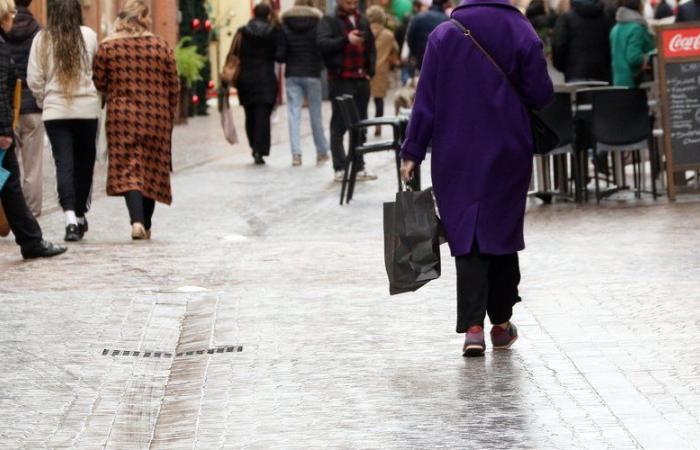the essential
The latest figures from INSEE confirm this: if Tarn-et-Garonne continues to gain inhabitants (+ 0.5%) it is only because of a positive migratory balance. Because the number of deaths is greater than that of births.
Tarn-et-Garonne continues to gain inhabitants, but at a rate half as slow as at the beginning of the 2010s. This is the main lesson of the latest demographic study published by INSEE which publishes the reference populations 2022 vintages: figures which come into force from January 1, 2025. Remember that INSEE uses the annual census method based on 5-year collection cycles.
For Tarn-et-Garonne, the new reference population figure therefore stands at 264,924 inhabitants. Our department remains the 8th department of Occitanie. Between 2016 and 2022, Tarn-et-Garonne gained on average 1,338 inhabitants per year (the equivalent of a municipality like Montaigu-de-Quercy), or + 0.5% annually. Compare with the period 2011-2016 when the annual gain was 1%, or 2,470 more inhabitants. “This slowdown is due to both a deterioration in the natural balance and a slight decline in the attractiveness of the department. From 2017, deaths have outnumbered births in Tarn-et-Garonne. The population is therefore now increasing only thanks to migrations”, notes the Studies and Dissemination service of INSEE Occitanie.
Montauban 6th city in the Occitanie region
The rate of population increase is also halved in the commune of Montauban, and more broadly in the urban unit of Montauban (+ 0.6% per year between 2016 and 2022 compared to + 1.2% or 1.3 % between 2011 and 2016). Again due to a deterioration of both the natural balance and the migratory balance.
In the ranking of towns with more than 40,000 inhabitants, Montauban ranks 6th with 62,487 inhabitants (municipal population). If we include the separate counts (students, soldiers and residents of health establishments), the city of Ingres exceeds 64,000 inhabitants. With 81,764 inhabitants, the urban unit (1) of Montauban is the 8th largest in the Occitanie region, closely followed by Tarbes (80,963) but a good distance from Albi (74,817).
The top 10 municipalities
The ten most populated municipalities in the department of Tarn-et-Garonne (the figures are those of the total population):
MONTAUBAN: 64,048
CASTELSARRASIN: 14,578
MOISSAC: 13,928
CAUSSADE: 7,052
MONTECH: 6,804
NEGREPELISSE : 5 943
Valence-D’Agen : 5 435
VERDUN-SUR-GARONNE: 4,999
MONTBETON: 4,422
GRISOLLES: 4,284
Moissac close on Castelsarrasin’s heels
Behind Montauban, the match is getting closer and closer between Castelsarrasin and Moissac. The sub-prefecture town remains the 2nd town in the department with 14,578 inhabitants but, with a higher rate of growth (+ 1.3% on average over the period 2016-2022 compared to only + 0.5% in Castelsarrasin), Moissac is nibbling its delay and is now close to 14,000 inhabitants.
Montech, which gains 0.9% of population each year, is getting closer to Caussade, which is decreasing (-0.1%). Nègrepelisse targets 6,000 inhabitants.
The Tarn-et-Garonne population is generally growing more in the areas close to Montauban (like Saint-Etienne-de-Tulmont which exceeds 4,000 inhabitants and Bressols which is close to them), the Toulouse conurbation and Moissac and Castelsarrasin. Certain small towns located in these territories stand out for their strong demographic growth over the recent period: Montbartier (+ 5.06%) Pompignan, Aucamville, etc.
Montauban 3, most populated canton
Here is how the population of Tarn-et-Garonne is distributed by district and canton.
Montauban district: 92 municipalities, 185,836 inhabitants (municipal population), 189,926 (total population).
Castelsarrasin district: 103 municipalities, 79,088 inhabitants (municipal population), 80,738 inhabitants (total population).
The 15 cantons:
Aveyron-Lère: 20,518 inhabitants.
Beaumont-de-Lomagne: 13,950.
Castelsarrasin: 22,141
Garonne-Lomagne-Brulhois: 13,739
Moissac: 15,247
Montauban-1: 20,816
Montauban-2: 20,597
Montauban-3: 22,635
Montech: 22,459
Pays de Serres Sud-Quercy: 13,298 Quercy-Aveyron: 15,360
Quercy-Rouergue: 14,206
Tarn-Tescou-Quercy green: 20,280
Valence-d’Agen : 13 841
Verdun-sur-Garonne: 21,577.
To the northwest, Valence-d'Agen, and more generally the territory of Deux-Rives, attracts new inhabitants. This is less true for Lomagne and the Pays de Serres, where the population is stagnating (for example in Beaumont) or even decreasing slightly (Lauzerte, Montaigu).
According to INSEE projections (central scenario), the population of Tarn-et-Garonne should continue to increase but more and more slowly, until it reaches around 282,000 inhabitants in 2050.






